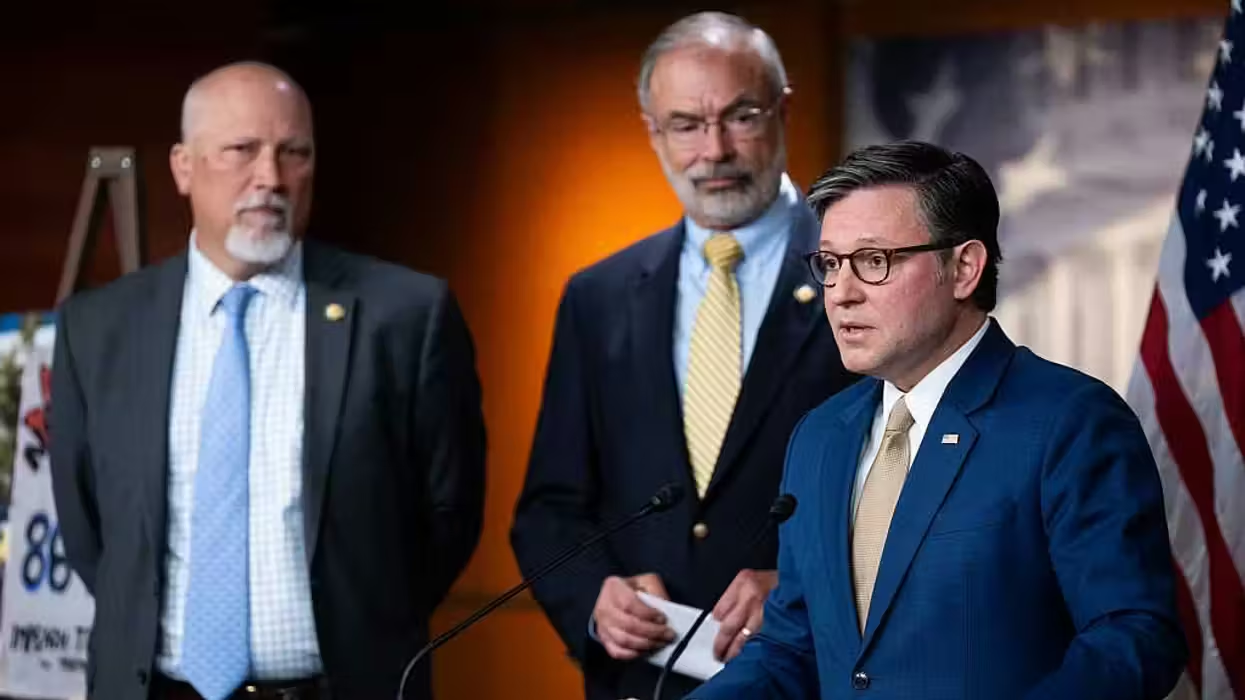
© 2026 Blaze Media LLC. All rights reserved.
Does GOP Have 'No Other Choice But to Push Immigration Reform'? The Party's Future Could Depend on it
December 04, 2012
"This topic of immigration has been the divisive wall between the Republican Party and hispanics."
 Editor’s Note: This is the third in a series of articles examining what went wrong for the Republican Party in the 2012 presidential election and where the GOP goes from here. Please visit our special section GOP: What Next? to follow the series of stories and find related content.
Editor’s Note: This is the third in a series of articles examining what went wrong for the Republican Party in the 2012 presidential election and where the GOP goes from here. Please visit our special section GOP: What Next? to follow the series of stories and find related content.
--
Does the Republican Party's future depend on reaching out to Latinos? In the wake of the 2012 election, much has been said about the movement's failure to capture Hispanic voters -- many of whom embrace conservative, if not Biblical values. The party is viewed by some experts who know the Latino community well as too far to the right and unnecessarily aggressive on the issue of immigration. If the GOP hopes to have a viable future, these individuals argue that the political movement will need to advance reforms, lay stronger groundwork and address the issue more fervently.
Considering the massive dearth in Latino support for Republican candidate Mitt Romney, many conservatives have agreed that immigration was likely a catalyst for the major separation. Despite aligning with Republicans on a plethora of issues, Hispanics overwhelmingly supported President Barack Obama in the 2012 election. In fact, the disparity between support for the president over Romney was astounding -- 72 percent versus 23 percent.
Considering this massive gap in allegiance between the two parties, one would assume that Latinos align perfectly with Democratic values, however reality paints a starkly different picture.
WHERE LATINOS STAND ON THE ISSUES
While Hispanics are not necessarily in line with Republicans on every measure, they certainly have disagreements with the Democratic Party as well. Some key variables undoubtedly cause some head-scratching when it comes to why so few Latinos chose Romney in 2012, as the cohort's moral compass on a variety of social and political issues does, indeed, appear to be right of center.
A recent study by the Barna Group, the American Bible Society, the National Hispanic Christian Leadership Conference (NHCLC) and OneHope came to some fascinating conclusions about Latino Americans. The report, "Hispanic America: Faith, Values & Priorities," looks at some of the characteristics of a growing minority population -- one that, in many ways, naturally aligns with conservative values.
Take, for instance, the Hispanic view on the separation of church and state. An overwhelming proportion of individuals in this cohort (69 percent) believe that public schools should teach Biblical values. Four in 10 (42 percent) claim that the Bible influences their social and political views as well. A highly faith-driven group, the survey found that 61 percent of Hispanics have made a commitment to Jesus Christ and are, in some capacity, "Christian."
The role of the family is also important to Hispanics, as the majority believe that the most pertinent method for them to contribute to American society is through their strong commitment to the family unit. Nearly eight out of 10 also believe that the traditional unit is the key to a healthy society -- sentiment that is clearly central to many conservatives' worldview.
Additionally, 69 percent think that children are better off with married parents and 66 percent agree explicitly with the "traditional definition of marriage" (one man and one woman). Considering Republicans on the whole, as of May 2012, 74 percent reported believing that same-sex marriage should not be legalized (as opposed to only 34 percent of Democrats). But that's not all. Six in 10 also believe that sexual intercourse is an action that belongs within the confines of marriage.
Despite these findings on gay marriage (the above statistics take into account opinions about traditional marriage and not legalities), the Pew Research Center has found that Hispanics are as likely as the rest of society to claim that homosexuality should be accepted. However, on abortion, Latinos are actually more conservative than the general public. While 41 percent of all Americans believe that abortion should be illegal in most or all cases (according to Pew), 51 percent of Hispanics say the same.
 Photo Credit: AP
Photo Credit: AP
And a willingness to do hard work -- a trait that is revered (at least rhetorically) by many conservatives is also shared by Latinos. While only 58 percent of the general public claims that people can get ahead if they work hard, an overwhelming (75 percent) of Hispanics say the same.
When it comes to issues of opportunity, the Latino community in America has some major concerns. As far as dropout rates among youth and unemployment go, nearly six-in-ten Hispanics are "very concerned." Healthcare and housing fall not far behind, with 54 percent and 52 percent of the community claiming they are very concerned. And immigration, a hot-button issue that could be driving Latinos away from Republicans was also on the docket, with 53 percent of the community holding a high level of concern.
THE REPUBLICAN RESPONSE TO IMMIGRATION REFORM
With demographic changes posing some major challenges for the GOP, now more than ever it is paramount that leaders figure out how to reach all Americans, including the ever-growing Hispanic populace. Considering the 2012 campaign, some might feel that achieving this goal is seemingly impossible.
But not everyone has given up hope that the Republican Party can make inroads with Hispanics. And, based on the aforementioned indicators, there's plenty of opportunity for right-of-center messaging to resonate with this portion of the population.
TheBlaze spoke with the Rev. Samuel Rodriguez, president of the NHCLC, to gain better insight into the Hispanic community and the ways in which Republicans can better court its members. Despite the dismal showing that Latinos gave Republicans at the polls, the faith leader said that now, more than ever, the GOP has an opportunity to reach this important cohort.
 Rev. Samuel Rodriguez (Photo Credit: NHCLC)
Rev. Samuel Rodriguez (Photo Credit: NHCLC)
"We've never been down this road before. This is arguably the best hour to engage the Hispanic electorate," he told TheBlaze. "To a great degree, the...conservative movement has an opportunity -- 44 percent [of Hispanics] voted for Bush in 2004."
Rodriguez, who has been heralded the "Hispanic Billy Graham," with some pondering whether the charismatic leader will replace the famed evangelist, described himself as a non-partisan. While he doesn't embrace either side of the fence, he noted -- as the statistics in the NHCLC study show -- that there are some stances and proclamations in the Republican Party platform that Hispanics agree with wholeheartedly. However, in Rodriguez's view, one, key issue has divided Latinos and the GOP of late: Immigration.
"This topic of immigration has been the divisive wall between the Republican Party and Hispanics," he told TheBlaze. "It's all about immigration."
While Rodriguez explained that Latino values align more closely with Republican and conservative ideals, Hispanics find themselves between "a rock and a hard place." To begin, the Democrats, despite holding views that run contrary on the social front, are good for the group on immigration.
The faith leader said that, if the GOP amends its position on this key issue, Hispanics will be more likely to turn toward the party. If the political movement can draft a plan that is not amnesty, yet reforms the system, the effects could be great for the party, Rodriguez contends. Based on the 2012 election results, he claims that the GOP "has no other choice but to push immigration reform" in the next two years.
"They need to pass immigration reform and they need to share credit," Rodriguez said of House Republicans. "They [also] need to reconcile Abraham Lincoln's platform with Reagan's optimism."
The Wall Street Journal echoed these sentiments in an article published last month, writing, "When Republican Presidential candidates are preoccupied with putting up an electrified fence along the Rio Grande and blaming Latinos (wrongly) for driving up crime, unemployment and health-care costs, we are a long way from Ronald Reagan's welcoming GOP."
Like the ideals captured in the WSJ article, Rodriguez is calling for a GOP more rooted in the advancement of freedom in the spirit of Lincoln, with a welcoming and positive tone reflective of Reagan. Right now, he said that the Republican Party is examining its identity and that, at the moment, there is a "question mark" when it comes to determining what it means to be a conservative.
 Photo Credit: AP
Photo Credit: AP
Rodriguez also urged Republicans to abandon divisive immigration rhetoric. This wording about immigrants, which he maintains is coming from the "far right," tends to alienate Latinos from the GOP.
In the wake of the election, of course, many on the right have panicked, seeking quick fixes to the GOP's demographic problems. In the end, though, even if a greater proportion of Hispanics in America voted for Romney and adhered to Republican political ideals, there are still other subgroups that the GOP needs to appeal to (see the second story in this series: The Reagan Coalition Is Dead - GOP Now Needs More Than Old White Men to Grow).
Based on New York Times analysis, Byron York broke down how Romney would have fared had Latinos gone out of their way to vote for the candidate in various states across the U.S.:
For example, they looked at Wisconsin, a state the Romney-Ryan team hoped to win. Hispanics weren't a huge part of the total vote -- about 4 percent, according to the exit polls -- and Obama won big among them, 65 percent to 31 percent. But going through the totals, Kopicki and Irving concluded that even if every single Hispanic voter in Wisconsin had cast a ballot for Romney, Obama still would have won.They found the same result for New Hampshire and Iowa, two other swing states Romney looked to win.
Then there was Ohio. According to the exit polls, Obama won 53 percent of the Hispanic vote there. But given how decisively Obama won other voting groups, Kopicki and Irving found that the president would have prevailed in Ohio even if he had won just 22 percent of the Hispanic vote. Put another way, even if Romney had won a stratospheric 78 percent of the Hispanic vote, he still would have lost Ohio.
In Virginia, Obama won the Latino vote 65 percent to 33 percent. Kopicki and Irving found that if those numbers had been reversed -- if Romney had won an unprecedented 65 percent of the Latino vote -- Obama still would have won Virginia.
In the end, it is certainly prudent for Republicans not to pander, but, instead, to capture support among all Americans, Hispanics included. Regardless if the cohort would have changed the election's results, one fact is clear: Hispanics are a growing population and a portion of the ever-changing American landscape.
HISPANIC AMERICANS POISED TO GROW IN INFLUENCE
If the GOP wishes to represent all Americans, then there is a paramount need for the party to address issues that are important to Latinos. While it is true that Republicans also had poor levels of support among women and youths, Hispanics are poised to grow monumentally in their influence. Currently about 14 percent of the nation is Latino; this will expand to around 30 percent by 2050, making it a dangerous cohort, at least politically speaking, to ignore.
Just days after the election, columnist Charles Krauthammer wrote the following about Hispanics: "They should be a natural Republican constituency: striving immigrant community, religious, Catholic, family-oriented and socially conservative (on abortion, for example)."
Krauthammer went on to note that Hispanics vote Democratic, in his view, because of illegal immigration. Romney, he contends, went too far right, later making it impossible for the candidate to backtrack enough to captivate their support.
"For the party in general, however, the problem is hardly structural. It requires but a single policy change: Border fence plus amnesty," he wrote. "Yes, amnesty. Use the word. Shock and awe — full legal normalization (just short of citizenship) in return for full border enforcement."
These ideals, of course, paint a starkly different picture from what was in the 2012 Republican Party Platform. A portion of the immigration section of the document read:
In an age of terrorism, drug cartels, human trafficking, and criminal gangs, the presence of millions of unidentified persons in this country poses grave risks to the safety and the sovereignty of the United States. Our highest priority, therefore, is to secure the rule of law both at our borders and at ports of entry.We recognize that for most of those seeking entry into this country, the lack of respect for the rule of law in their homelands has meant economic exploitation and political oppression by corrupt elites. In this country, the rule of law guarantees equal treatment to every individual, including more than one million immigrants to whom we grant permanent residence every year.
That is why we oppose any form of amnesty for those who, by intentionally violating the law, disadvantage those who have obeyed it. Granting amnesty only rewards and encourages more law breaking.
Clearly, this differs greatly from what Krauthammer recommends. TheBlaze also spoke extensively with Jose Antonio Vargas, the Filipino-American journalist-turned immigration rights activist. Vargas, an illegal (read part of his story here) who continues to battle for reforms to the current system, has had a successful career as a reporter with The Washington Post and The Huffington Post, among other outlets.
 In this June 20, 2012, file photo former Washington Post journalist turned immigration reform activist, Jose Antonio Vargas, center, an illegal immigrant himself, speaks in Washington. Credit: AP
In this June 20, 2012, file photo former Washington Post journalist turned immigration reform activist, Jose Antonio Vargas, center, an illegal immigrant himself, speaks in Washington. Credit: AP
Vargas, who claims he doesn't have a stake in either political party, recalled covering the Iowa caucuses during the 2008 campaign and interacting with Republicans on the issue of immigration.
"What was very clear in that week...is how simplistic the understanding is about immigration," he told TheBlaze. "We have this dominant narrative about what immigration is and who these immigrants are. I think the media overall have given us that narrative and I'm saying this as somebody who's a journalist myself."
As far as the Romney campaign goes, Vargas charged that the candidate was ignorant when it came to the issue, likening his comments about "self-deportation" to the infamous 47 percent clip that was widely circulated. The former journalist explained that immigration is highly personal for Hispanics and other immigrants, alike. Hearing certain rhetoric coming from the GOP -- the same rhetoric that Rodriguez spoke out against -- causes individuals to assume that Republicans are against their family members and friends.
"Immigration is not just a Latino issue...we're talking about a demographic issue," Vargas explained. "Look at America -- America looks the way that it does because of immigration."
If he were a political strategist, Vargas said that he would look at diversity and the future and find a way to help others feel included in the Republican Party. Rather than simply pandering, though, he urged for this process to be done "in such a way that's really honest."
"My goal in the next few months...is trying to engage and talk to and listen to as many conservatives and Republicans as I possibly can -- that's a really big goal," Vargas continued. "Because that's where the conversation needs that happen."
 Former Washington Post journalist turned immigration reform activist, Jose Antonio Vargas, right, an illegal immigrant, is overcome with emotion speaking to Gaby Pacheco, 27, of Miami, an illegal immigrant. Credit: AP
Former Washington Post journalist turned immigration reform activist, Jose Antonio Vargas, right, an illegal immigrant, is overcome with emotion speaking to Gaby Pacheco, 27, of Miami, an illegal immigrant. Credit: AP
Considering the 2012 election results and America's Demographic outlook, it's likely more conservatives than ever will be willing to listen -- and perhaps they should. On the whole, Americans have settled on a plan that seems more reflective of Krauthammer's vision and advice surrounding where immigration should go, at least according to election-day exit polls.
As noted in a previous analysis piece, the majority of Americans (65 percent) believe that illegals who are already in the United States should be granted "a chance to apply for legal status." Only 28 percent of the nation embraces the notion that these individuals should be deported back "to the country they came from" (on the whole, Romney voters, mainly Republicans, overwhelmingly embraced deportation).
Rather than moving too quickly and risking a perception of mere appeasement, the GOP should continue to examine this issue, to do some soul searching and to draft policy ideas that allow the party to maintain its dignity and views, while also welcoming Hispanics into the fold.
More Stories from the GOP:What Next? Series:
- Tea Party vs Progressive Republicans — Battle for the Soul of the GOP
- The Reagan Coalition is Dead -- GOP Now Needs More Than Old, White Men to Win
- Commentary: The GOP's Brand Suicide
- Commentary: How Not to Reform the Republican Party
Want to leave a tip?
We answer to you. Help keep our content free of advertisers and big tech censorship by leaving a tip today.
Want to join the conversation?
Already a subscriber?
Billy Hallowell is a digital TV host and interviewer for Faithwire and CBN News and the co-host of CBN’s "Quick Start Podcast."
Billy Hallowell
Billy Hallowell is a digital TV host and interviewer for Faithwire and CBN News and the co-host of CBN’s "Quick Start Podcast."
more stories
Sign up for the Blaze newsletter
By signing up, you agree to our Privacy Policy and Terms of Use, and agree to receive content that may sometimes include advertisements. You may opt out at any time.
Related Content
© 2026 Blaze Media LLC. All rights reserved.
Get the stories that matter most delivered directly to your inbox.
By signing up, you agree to our Privacy Policy and Terms of Use, and agree to receive content that may sometimes include advertisements. You may opt out at any time.






